Startup Bootcamp For Lawyers #2
I turn the mic to Jay Mandal, creator of the Startup Bootcamp for Lawyers and a CodeX Fellow and lecturer, lawyer, and product and design expert. —Monica Bay
By Jay Mandal
Lawyers creating startups? You think? Actually, many members of the Stanford Law School. When CodeX announced the second annual Startup Bootcamp for Lawyers, it was quickly oversubscribed with 55 students trying to register.
THE PARTICIPANTS & AGENDA
The Startup Bootcamp for Lawyers leaders decided to stick with our rule of only 25 SLS students. We believe in diverse teams, in the startup world and law, in order to present the best options for clients. This year’s Startup Bootcamp participants were 50/50 women and men; and 50/50 J.D.s and LLMs — and 10 different nationalities in the class!
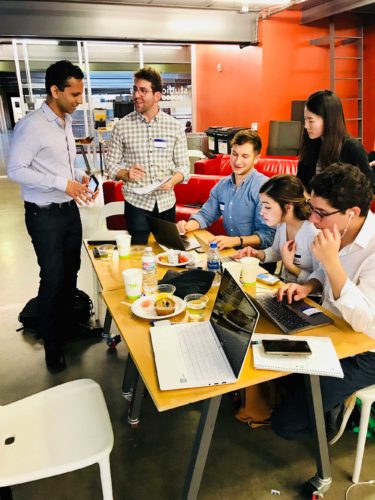
As last year, Startup Bootcamp for Lawyers was designed as a hands-on workshop to experience the startup journey—by learning and applying the design and product skills necessary to build a startup. “The goal is to help the students become more entrepreneurially-minded practitioners within law firms, as in-house company counsel, or even as future startup founders,” said Kate Didech, co-organizer.
The two and a half days of class were intense. On Wednesday morning (April 4) five separate teams of students brainstormed and finalized their product ideas.
Saturday (April 7) morning’s agenda started with my lectures on understanding product market fit, learning how to prototype, and customer testing. Students then built their first product prototypes, and immediately began customer testing their ideas to see if they would fly or fail. In the afternoon, they learned about effective fundraising pitches, then immediately got to work on developing their pitches and getting constructive criticism from coaches.
Sunday (April 8) started with a “Business Case Negotiation,” session followed by an Entrepreneurship Panel. The teams then refined their pitches, with mini-critique sessions, to get ready for the final session. At 3:30 p.m., the Venture Capitalist pitches began. (Jay Mandal with the eMediate team of David Popkin, Joseph Zabel, Daniela Pardo and Hae Min Lee. Photo: Ben Gloger.)
THE STARTUP COACHES
Dan Linna: Director of LegalRnD – The Center for Legal Services Innovation. Professor of Law in Residence, Michigan State University College of Law.
David Schwarzbach: COO Optimizely.
Singari Seshadri: Head of Stanford Venture Studio. Monica Bay: CodeX Fellow; Journalist, Lawyer.
Ben Gloger: Class Teaching Assistant, entrepreneur, and SLS 3rd year student.
The traditional class framework emphasizes one person speaking the whole time during a class session without feedback. Here, we employed experiential teaching with 20% lecture time, 80% building time with periodic feedback on progress from experienced experts from industry and academia. These experts provided constructive criticism on their business piteches, products and protoypes at different stages in the class.
Linna noted: “The students surprise even themselves when they see how much can be accomplished in a short time by following startup principles. Learning these skills not only prepares law students for the startup world, it helps them build essential 21st century lawyering skills. (My students loved the condensed version of the startup bootcamp that Jay did for my law students at Michigan State and the University of Michigan.“) From left: Dan Linna & Singari Seshadri. (Photo: Monica Bay.)
SUNDAY CONVERSATION

After the adrenaline rush of two days of building a startup, the students spent Sunday afternoon hearing the stories and battle scars of three seasoned entrepreneurs:
From left:
• Rishi Mandal, former CEO of Sosh (sold to Postmates).
• Roland Vogl: Executive Director of CodeX and Lecturer at Stanford Law.
• Darren Koch, Chief Product Officer, SAP Network Group..
The discussion (including me) addressed the perseverance needed to build and sustain disruptive ideas within the small and large company environment, and other topics. (Photo: Monica Bay)
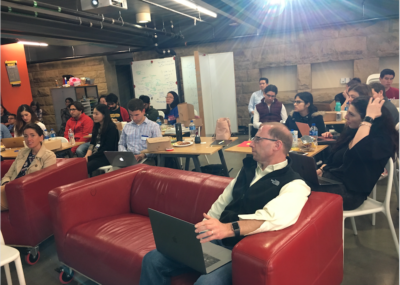
THE PITCH
TO THE VENTURE CAPITALS
Then, the moment of truth arrived. Each team gave their six minute pitch to the judge panel of three venture capitalists. The teams showcased their business ideas and prototypes, and asked for funding and resources.
The VC panel included:
Saad Khan Co-founder, partner at Uprising.
Megan Quinn General Partner, Spark Capital.
Alex Gould Co-Founder/General Partner at Gold Star Ventures, L.P., Instructor — Stanford Economics Department.
Moderator: Kate Didech.
(Alex Gould and Megan Quinn: Photo: Monica Bay.)
THE 2018 WINNERS

BEST COMPANY: Health Bar (Health/Fitness app)
Description: “Gamify exercise and good eating habits to combat the obesity and health problem in the US. Monetize by engaging employee sponsored health plans to provide this app for patients.”
Team members: Audrey Kim, Mary Hwang, Ashwin Aravind, Kaber Choudhary, Kevin Kulwick. (Photo by Ben Gloger.)
Interesting fact: This engages the full health ecosystem of patients, insurers and health plans — specifically helping insurers reduce medical insurance charges by improving overall health, and allow employer sponsored health plans to use analytics from patient users to encourage even better health habits.
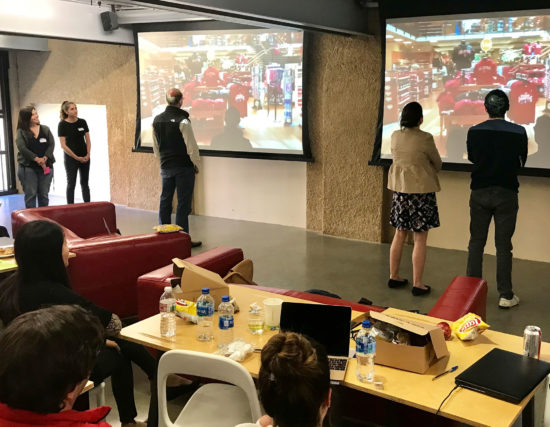
BEST PROTOTYPE:
Tapp (virtual reality ecommerce app).
Description: Virtual reality ecommerce app to provide the convenience of online shopping in a virtual brick-and-mortar setting.
Team members: George Brown; Alexandra Valicenti; Vincent Sheu; Thais Carvalho; Nora Oyarzabal Oyonarte.
Interesting fact: VC judges were wowed as they stood in front of a big screen and saw an immersive video demo in which they saw themselves as a virtual user walking through the Stanford bookstore and choosing a Stanford-branded pillow. (The team handed them the pillow at the end of the demo!) (Photo by Ben Gloger.)
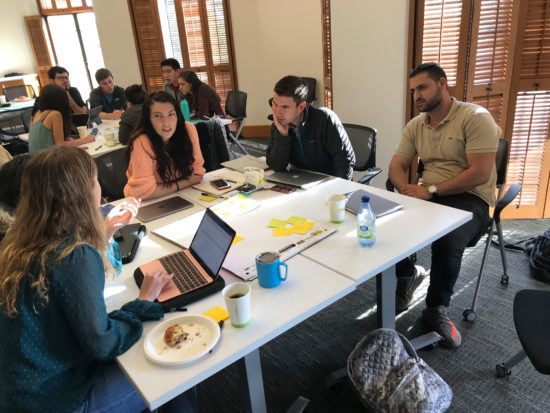
BEST PITCH: CreditConnect (Credit access app).
Description: A referral based credit platform that provides non-citizens living in the U.S. immediate credit card access and a personal finance app.
Interesting fact: Difficult for many non-U.S. citizens to get access to credit, and most team members are LLMs so directly felt the pain of trying to get credit access in the U.S.
Team members: Astrid Rocha, Rhyea Malik, Gwen Karanadze, Clint Akarmann, Nathan Kahrobai. (Photo by Ben Gloger.)
OTHER TEAMS
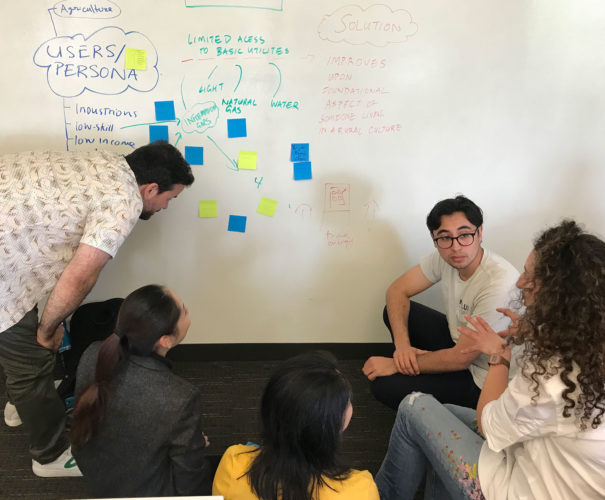
Pluri (Developing world work matching onbile app). A digital job board that connects workers with job opportunities in real time, targeting agrarian laborers looking for work in developing countries such as India.
Team members: Gunhan Pikdoken, Kanravee Kittayarak, Yixin Gong, Joshua Rosefelt, and Camila Marino Venegas. (Photo by Ben Gloger.)
eMediate (algorithm driven legal mediation app). An app that allow users to address everyday negotiation scenarios and generate customized contracts quickly and affordably.
Team members: Joseph Zabel, Hae Min Lee, Daniela Pardo, Jorge Gabriel Jimenez Barillas, and David Popkin.
SIX QUOTES
Roland Vogl is the Executive Director of CodeX: The Center for Legal Informatics and the Executive Director of the Stanford Program in Law, Science and Technology. He is a Lecturer in Law at Stanford Law School. “The Bootcamp for Lawyers is a unique educational experience for law students challenging their creativity, problem-solving skills, and team working abilities in a way that is not usually taught in law school. I am truly excited about the energy of this class and the high quality students and presenters the organizers have brought together.”
Lucy Ricca, Executive Director of the Stanford Center on the Legal Profession: “Our law students look for new and different ways to use their legal training and engage in Stanford’s entrepreneurial ecosystem. It was great to see such hard work and thought go into the bootcamp and I congratulate all who participated.”
Megan Quinn, General Partner at Spark Capital. “I really enjoyed participating in the Startup Boot Camp for Stanford law students. It’s fascinating to see the kinds of ideas that develop when a classically trained legal mind is applied to entrepreneurial pursuits.”
Saad Khan Co-founder, partner at Uprising. “This was my second year involved with the program. It’s been inspiring to see the quality of thinking and the sheer hustle that the students put into their projects. Empathy and understanding for the process will serve these teams well whatever their future careers. But if these law students decide not to be practicing attorneys, I think we’ll have the next pool of bad ass Stanford entrepreneurs to watch.”
Yixin Gong, LLM student: “The Bootcamp was both empowering and inspiring. Being thrown into the deep end to brainstorm, prototype, iterate on and finally pitch a product aimed at solving a developing world problem helped me realize the potential impact a small team can make.”
THE VISION, RESULTS & SURPRISES
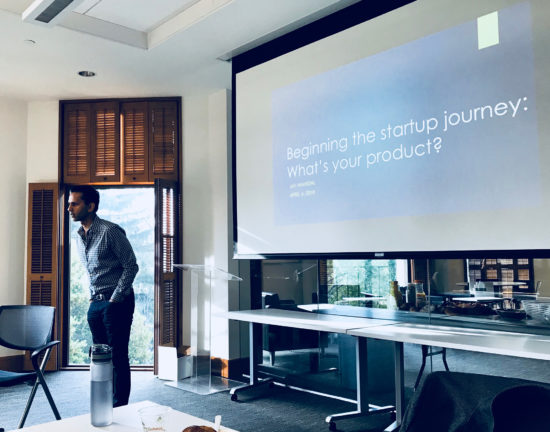
What was the vision? First, to give lawyers a crash course on the skills needed to build a startup in order to become more entrepreneurially-minded lawyers. As they developed product ideas, built prototypes, and drafted a pitch deck in the class, they developed an understanding of an entrepreneur’s journey and challenges. This working knowledge would benefit them as practitioners within law firms, as in-house company counsel, or even as future startup founders.”
Our second aim was to demonstrate how their legal analytical training could be used to resolve critical real world problems, which they did beautifully in the class.
I was most surprised by the passion of the students to jump right in. This was the first time many of the students had been exposed to concepts like prototyping products or customer testing, but they did not hesitate in testing different approaches, asking questions, and at times failing. They were gritty and very motivated in finding the best options, using a new tool box of skill sets from the class.
Next year, we will provide even more complex business cases that force them to think about solving some of the world’s most intractable problems. We want to push law students even more. I firmly believe lawyers can be trained to be some of the best problem solvers of the world’s most pressing problems. (Photo: Ben Gloger.)
CLOSING WORDS
Kate Didech: “As a former litigator who pivoted to working in startups, my goal was to expose the students to a few non-traditional paths they can take with a law degree. I was also excited to have the students flex their creative muscles and start thinking more like designers and entrepreneurs, focused on possibilities and opportunities, rather than as attorneys, concentrating on potential problems and pitfalls.”
Audrey Kim, third year law student: “If you’d asked me a month ago what my five-year plan was, I would have told you that I was going back to an in-house legal department after a few years at a law firm, no question. Now, five years from now you might find me at the startup I will have created. No matter what, the bootcamp changed the way that I think about startups. They’re not just pie-in-the-sky ideas I talk about blithely with friends, and they’re not just things that other people do. Now, I know that creating a startup is something that I can do. …I had no idea going into it that it would be this fun, and this eye-opening.
THE SPONSORS
The Stanford Center for the Legal Profession and CodeX – The Stanford Center for Legal Informatics.

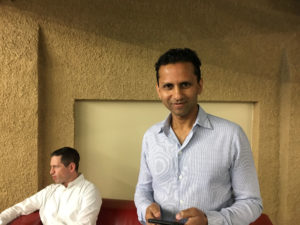
ORGANIZERS
Jay Mandal (right) is a lecturer, lawyer, and product and design expert. He is currently VP of Product Strategy at SAP and Stanford CodeX fellow. He previously served as CEO/co-founder of a Google Ventures-funded startup and as head M&A lawyer at Apple. This is the second year he’s organized this class, and he lectures in the areas of entrepreneurship and law, legal ethics, and negotiation. (see profile for more).
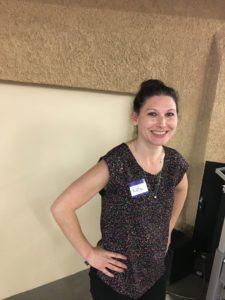
Kate Didech: Co-organizer. She is an attorney, urban planner, and Fellow at Stanford CodeX. (See profile for more).
“Organizers” photos and the cover photo: Monica Bay.

